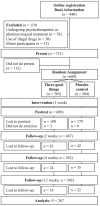Do beliefs in the malleability of well-being affect the efficacy of positive psychology interventions? Results of a randomized placebo-controlled trial
- PMID: 35001513
- PMCID: PMC9788089
- DOI: 10.1111/aphw.12338
Do beliefs in the malleability of well-being affect the efficacy of positive psychology interventions? Results of a randomized placebo-controlled trial
Abstract
The present study examines the role of beliefs about the malleability of well-being in a randomized, placebo-controlled, online positive psychology intervention targeting 267 German-speaking adults (83% women, mean age = 43.16 years). The participants of the experimental group ("three good things" intervention) and placebo control group ("early memories") reported their levels of happiness before and immediately after the 1-week intervention, as well as 2, 4, and 12 weeks after the intervention. Furthermore, the researchers recorded how participants completed the exercises and to what extent they liked the exercises. This study also assesses the participants' beliefs surrounding two different aspects of malleability (well-being is modifiable in general, and one knows how to change their well-being). Although both aspects of malleability were strongly intercorrelated, beliefs about how to change one's well-being seemed particularly relevant in the context of positive psychology interventions: Those who reported a stronger belief about how to change their well-being liked the intervention better and more often completed the activity as instructed. Further, they reported greater increases in well-being as compared with the control group. We conclude that beliefs about the malleability of well-being might represent an important moderating variable in the effectiveness of positive psychology interventions.
Keywords: change beliefs; growth mindset; online intervention; positive psychology intervention; randomized placebo-controlled study; well-being.
© 2022 The Authors. Applied Psychology: Health and Well-Being published by John Wiley & Sons Ltd on behalf of International Association of Applied Psychology.
Conflict of interest statement
The authors state that there are no conflicts of interest.
Figures
References
-
- Allemand, M. , & Flückiger, C. (2017). Changing personality traits: Some considerations from psychotherapy process‐outcome research for intervention efforts on intentional personality change. Journal of Psychotherapy Integration, 27, 476–494. 10.1037/int0000094 - DOI
-
- Bates, D. , Mächler, M. , Bolker, B. , & Walker, S. (2015). Fitting linear mixed‐effects models using lme4. Journal of Statistical Software, 67(1), 1–48. 10.18637/jss.v067.i01 - DOI
-
- Carr, A. , Cullen, K. , Keeney, C. , Canning, C. , Mooney, O. , Chinseallaigh, E. , & O'Dowd, A. (2020). Effectiveness of positive psychology interventions: A systematic review and meta‐analysis. The Journal of Positive Psychology, 16, 749–769. 10.1080/17439760.2020.1818807 - DOI
-
- Chakhssi, F. , Kraiss, J. T. , Sommers‐Spijkerman, M. , & Bohlmeijer, E. T. (2018). The effect of positive psychology interventions on well‐being and distress in clinical samples with psychiatric or somatic disorders: A systematic review and meta‐analysis. BMC Psychiatry, 18, 211. 10.1186/s12888-018-1739-2 - DOI - PMC - PubMed
Publication types
MeSH terms
LinkOut - more resources
Full Text Sources


